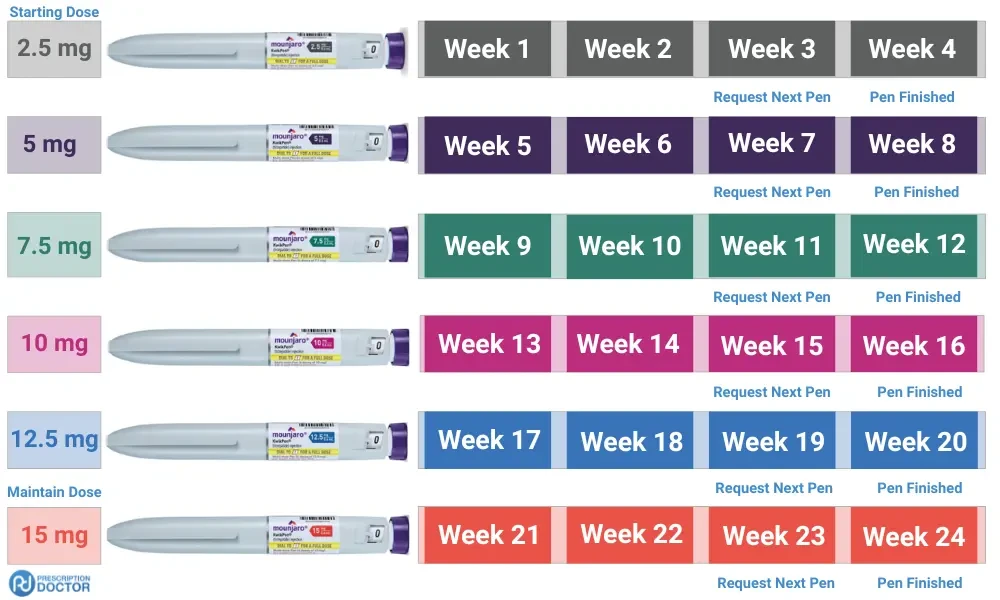What are the Side Effects of Mounjaro?
Mounjaro is a popular weight loss injection with a strong reputation for delivering significant results. If you’re exploring the idea of using licensed medication alongside a healthy diet and regular exercise to help you shed the pounds, you’ll likely want to research the products as much as possible, so you can determine which one is right for you.
In addition to how Mounjaro works and the amount of weight you can expect to lose with the treatment, one of the most common queries potential patients have concerns side effects and how to manage them.
So, what are the side effects of Mounjaro, how long do they last, and what can you do to mitigate symptoms? Read on to learn everything you need to know.
START YOUR MOUNJARO CONSULTATION TODAY
Mounjaro Injection Side Effects: The Lowdown
Like all medications, Mounjaro has the potential to cause side effects, and you should be aware of these before embarking on a treatment plan. They can range from mild to severe, and some symptoms are more common than others.
Here are the main side effects of Mounjaro that you may encounter during your weight loss journey:
Common Side Effects of Mounjaro
The most common side effects of Mounjaro are gastrointestinal symptoms. These affect at least 5% of patients and include:
- Nausea
- Diarrhoea
- Decreased appetite
- Vomiting
- Constipation
- Dyspepsia (indigestion)
- Abdominal pain
- Trapped wind
Gastrointestinal side effects caused by Mounjaro are typically mild or moderate in severity, but can lead to more serious health conditions, such as dehydration. Always seek the advice of a clinician if your stomach problems are severe or persistent.
Uncommon Side Effects of Mounjaro
Tirzepatide (the active ingredient in Mounjaro) lowers blood sugar and was originally developed as a treatment for type 2 diabetes. This effect produces a risk of hypoglycemia (very low blood sugar) in people using this medication, with symptoms including:
- Shakiness
- Hunger
- Tiredness
- Dizziness and lightheadedness
- Confusion
- Irritability
- Irregular heartbeat
- Vision problems
- Difficulty speaking clearly
Hypoglycemia is an uncommon side effect of Mounjaro, but in serious cases, it can lead to seizures and loss of consciousness. It most frequently affects people using Mounjaro alongside other medications that lower blood sugar, such as insulin or sulfonylureas.
Mounjaro
- Approved Weight Loss Treatment
- Suitable for adults with a BMI of +30kg/m²
- Pre-filled injection pen
Some of the less common Mounjaro side effects may indicate a more serious underlying medical condition, such as an allergic reaction. These should be immediately reported to a doctor and include:
- Difficulty breathing
- Difficulty swallowing
- Swollen face, throat, or tongue
- Rapid heartbeat
- Gas pain in the stomach
- Bloating
- Heartburn
- Recurrent fever
- Skin rashes, itching, or redness
- Yellow skin or eyes
Other uncommon Mounjaro side effects that don’t typically require medical attention include:
- Pain, discomfort, or warmth at the injection site
- Dry mouth
Rare Side Effects of Mounjaro
In rare cases, Mounjaro can trigger more severe medical issues such as:
- Kidney injury (possibly as a side effect of dehydration caused by gastrointestinal symptoms)
- Pancreatitis (inflammation of the pancreas)
- Liver injury
- Gallbladder disease
- Severe gastrointestinal problems
- Eye problems (in patients with diabetic neuropathy)
If you have questions about any side effects of Mounjaro, consult a healthcare professional for advice. Symptoms that are severe, persistent, or particularly uncomfortable may be a sign that you require medical attention.
How to Manage Mounjaro Side Effects
Stomach problems are very common among people using Mounjaro and can be mild, moderate, or severe. Learning to manage Mounjaro side effects can make your weight loss journey more comfortable and, potentially, more successful.
People with gastrointestinal issues may be able to reduce their symptoms by:
- Eating smaller meals (for example, by splitting three meals into four or more)
- Eating slowly and only when very hungry
- Stopping eating when full
- Avoiding lying down immediately after eating
- Abstaining from activity after eating
- Not eating too close to bedtime
Dietary changes may also help improve gastrointestinal symptoms, for example:
- Avoiding fatty foods or sugary foods
- Choosing bland, easily digestible foods
- Increasing water intake
- Drinking water one hour before and after meals
- Choosing foods with high water content (e.g., soup)
- Avoiding spicy foods and alcohol
- Consuming mint and ginger-based drinks to combat nausea
People who experience vomiting or diarrhoea as side effects of Mounjaro should drink plenty of fluids to avoid dehydration. Always speak to a healthcare professional about any persistent symptoms that concern or bother you.
How Long Do the Mounjaro Side Effects Last?
Most of the time, Mounjaro side effects are mild to moderate in severity. They usually flare and fade during different stages of Mounjaro treatment, with most gastrointestinal symptoms occurring during dose increases.
Mounjaro Day 1 Side Effects
The most common Mounjaro side effects (nausea, vomiting, and diarrhoea) can begin at any time in the first four weeks of treatment. However, they can also start on the day of your first injection, so don’t worry if your side effects kick in quickly. Follow the recommendations listed above to help alleviate symptoms, and consult a clinician if they persist.
Mounjaro Side Effects When Increasing Dose
You are most likely to experience gastrointestinal symptoms when you first start taking Mounjaro and when increasing your dose. These flare-ups are usually temporary, and you may be able to manage them using the advice above. However, if your symptoms are particularly uncomfortable, you can discuss with a clinician about delaying the dose increase.

Mounjaro Missed Dose Side Effects
You are unlikely to experience side effects if you miss a single dose of Mounjaro. If you forget to administer an injection, do so as soon as possible within the first 4 days after the missed dose. If 4 days have passed, skip it that week and take your next dose on the day of your next scheduled injection.
If you’ve missed more than one dose of Mounjaro, you should speak with a clinician before resuming treatment. This is because, after two weeks, most of the drug is likely to have left your system, and gastrointestinal side effects may return when you restart the medication. You may also experience an increase in appetite as the effects of the drug wear off, which can lead to overeating.
Wegovy vs Mounjaro Side Effects
Mounjaro (tirzepatide) and Wegovy (semaglutide) belong to the same class of drugs, and their side effects are very similar. Both medications cause nausea, vomiting, and diarrhoea at similar rates. However, these symptoms may occur at higher rates with Mounjaro than Wegovy, especially with larger doses. Hypoglycemia, a less common side effect of both drugs, also occurs at similar rates with Mounjaro and Wegovy.
Mounjaro Side Effects FAQs
Understanding the side effects of Mounjaro (and how to manage them) can be key to successful weight loss with this medication. As mentioned above, Mounjaro side effects most commonly affect the digestive system. However, you may have heard people mention other symptoms associated with Mounjaro, such as hair loss, mood changes, and fatigue, so let’s explore these in more detail.
Does Mounjaro Cause Hair Loss?
Some people report hair loss when using tirzepatide (the active ingredient in Mounjaro) and other medications in this drug class. However, there is currently no evidence that Mounjaro causes hair loss.
Instead, hair shedding may be a side effect of rapid weight loss resulting from Mounjaro treatment. It may also be a symptom of other health conditions like insulin resistance, metabolic syndrome and obesity.
Mounjaro
- Approved Weight Loss Treatment
- Suitable for adults with a BMI of +30kg/m²
- Pre-filled injection pen
Can Mounjaro Cause Depression?
Some people experience depression when using Mounjaro, but current research has not found a direct causal link between the two. However, many studies have found a strong association between being overweight or obese and depression and anxiety.
If you feel depressed or anxious while using Mounjaro, speak to a healthcare professional as soon as possible.
Does Mounjaro Make You Tired?
Fatigue is not a known side effect of Mounjaro; however, some people report feeling unusually tired when using other weight loss injections, such as semaglutide. This may be due to reduced calorie intake or dehydration resulting from vomiting and diarrhoea.
If you feel tired while using Mounjaro, be sure to stay hydrated and consult a clinician if the issue persists.
Prescription Doctor: Your Reliable Weight Loss Partner
Now that you have a better understanding of what the side effects of Mounjaro are, you should be able to form a clearer picture about whether the medication is right for you. So the next question is, where do you get it from?
At Prescription Doctor, we’ve supported people just like you throughout their weight loss journeys. From recommending the right treatments to offering essential diet and exercise advice, we’ll be with you every step of the way.
Our process begins with a simple online questionnaire, where you’ll provide information about your medical history. This is then reviewed by our expert team of clinicians, who assess whether the medication is suitable for your specific circumstances. If approved before 3pm on a weekday, your order will be dispatched for next-day delivery in discreet packaging. All of our products are dispatched from our General Pharmaceutical Council (GPhC)-registered pharmacy, ensuring you can be completely confident in the quality of our service.
Ready to begin your Mounjaro journey? Start your consultation with us today.
Sources
- US Food & Drug Administration: Mounjaro Prescribing Information
- European Medicines Agency: Mounjaro
- NIH (2024): Tirzepatide
- NIH: Low Blood Glucose (Hypoglycemia)
- Revisit Diabetes: How to Improve Gastrointestinal Tolerance in Treatment with GLP-1 Receptor Agonists
- Diabetes, Obesity, and Metabolism (DOM): Gastrointestinal tolerability and weight reduction associated with tirzepatide in adults with obesity or overweight with and without type 2 diabetes in the SURMOUNT-1 to -4 trials
- EMA: Mounjaro, INN-tirzepatide
- PubMed (2024:) Subcutaneously administered tirzepatide vs semaglutide for adults with type 2 diabetes: a systematic review and network meta-analysis of randomised controlled trials
- International Journal of Dermatology (2024): GLP-1 agonists and hair loss: a call for further investigation
- PubMed (2024): Treatment of insulin resistance with tirzepatide leading to improvement of hair loss
International Journal of Clinical Pharmacy: Psychiatric adverse events associated with semaglutide, liraglutide and tirzepatide: a pharmacovigilance analysis of individual case safety reports submitted to the EudraVigilance database - JAMA (2010): Overweight, Obesity, and Depression A Systematic Review and Meta-analysis of Longitudinal Studies
- JAMA (2022): Weight Loss Outcomes Associated With Semaglutide Treatment for Patients With Overweight or Obesity
Authored By

Kate Latham
Medical Content WriterPublished on: 19/06/2025
Reviewed By

Mohamed Imran Lakhi
MPharm - Lead PharmacistReviewed on: 19/06/2025
© 2013 - 2026 Al Muhsineen Limited. All Rights Reserved. Registered Pharmacy: 34 Halliwell Road, Bolton BL1 8RL. Registered Office: 254 First Floor, Shearbrow, Blackburn, England, BB1 8DS







